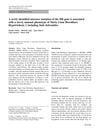Disease Causing Homozygous Variants in the Human Hairless Gene
December 2015
in “
International Journal of Dermatology
”

TLDR New and known mutations in the hairless gene cause a hair loss condition called Atrichia with papular lesions.
The study focused on five consanguineous Pakistani families suffering from Atrichia with papular lesions (APL), which is caused by mutations in the hairless gene (HR) located on chromosome 8p21.3. Linkage analysis confirmed the HR gene's involvement in all families, and sequencing identified a new homozygous nonsense variant in one family, as well as two known pathogenic variants in the remaining families. The research concluded that these mutations add to the known mutation spectrum causing APL and highlighted the need for detailed clinical outcome characterization of these HR gene variants to improve clinical care for affected individuals. The exact number of participants was not provided, but at least two affected individuals from each family were studied.












